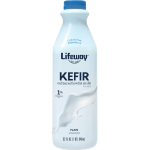- Messages
- 92
- Reaction score
- 186
- Points
- 43
Many individuals have been asking about my all-encompassing kefir recipe for digestive health.
Easiest Way: recipe below
Fun Way: With Kefir Grains
3-4 parts ORGANIC WHOLE MILK (raw milk better)
1 Part Lifeaway plain kefir

Exercise caution to prevent over-fermentation, which may result in the formation of whey curds. If fermentation is extended, a potent liquid whey may be obtained. There is a suspicion that this liquid whey may exhibit enhanced bioavailability compared to powdered whey. Subsequently, the infused liquid whey, containing the beneficial kefir probiotic strains, can be utilized for fermenting vegetables through a pickling process.
obviously there are kits you can buy for a less ghetto approach
enjoy!
MT
Easiest Way: recipe below
Fun Way: With Kefir Grains
3-4 parts ORGANIC WHOLE MILK (raw milk better)
1 Part Lifeaway plain kefir

- Begin by carefully combining one part Lifeaway kefir, shaken vigorously, with three parts whole or raw milk in a glass pitcher.
- Cover the top of the pitcher with a single sheet of paper towel.
- Secure the paper towel with a rubber band around the rim of the pitcher to prevent displacement and the intrusion of insects.
- Allow the mixture to rest in a location devoid of direct sunlight, maintaining a temperature between 70-80 degrees Fahrenheit for a duration of 18-24 hours.
- Stir the contents intermittently during the fermentation process.
Exercise caution to prevent over-fermentation, which may result in the formation of whey curds. If fermentation is extended, a potent liquid whey may be obtained. There is a suspicion that this liquid whey may exhibit enhanced bioavailability compared to powdered whey. Subsequently, the infused liquid whey, containing the beneficial kefir probiotic strains, can be utilized for fermenting vegetables through a pickling process.
obviously there are kits you can buy for a less ghetto approach
enjoy!
MT

